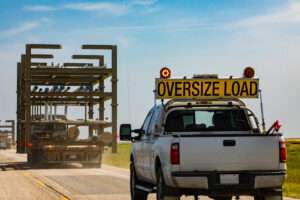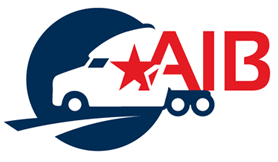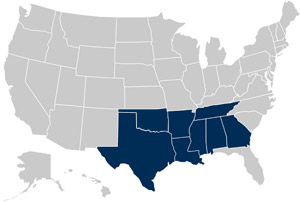The commercial trucking industry is full of challenges. Whether you’re operating a tow truck or a semi-truck, there are unique elements that require your attention.
When it comes to transporting a wide load or oversized truckload, there is even more to consider. But at American Insurance Brokers, safety and security is the foundation of everything we do. We strive to be the go-to resource for drivers and fleet owners across the south.
In this article, you’ll find some safety tips we’ve gathered for navigating these types of jobs with precision.
What Is Considered an Oversized Truck Load?
 According to estimates from the Department of Transportation, about 600 tons of wide loads and oversized truckloads are transported along our highways every year. What does this mean? Let’s break it down.
According to estimates from the Department of Transportation, about 600 tons of wide loads and oversized truckloads are transported along our highways every year. What does this mean? Let’s break it down.
An oversized load or overweight load exceeds the standard size for a truck operating on roads and highways. Similarly, a wide load may exceed the width of a typical lane on these various types of infrastructure, making it necessary to take up space in two separate lanes.
Each state has different guidance used to define the exact specifications that push commercial trucks into these categories. Some examples of vehicles that are often considered an oversized load include:
- Prefabricated and/or mobile homes
- Boats
- Construction equipment, such as bulldozers and cranes
- Construction materials, such as pipes and beams
- Agricultural equipment, such as tractors and harvesters
Oversized Load Regulations
Permits are granted by each state with certain oversized load regulations. These permits do not have to consider any federal requirements when it comes to non-divisible loads. These types of situations exceed applicable length or weight limits because separating into smaller loads would lead to the following:
- Compromised use, making it unable to perform the intended function
- Destroyed value, making it unusable for the intended purpose
- More than eight hours of work to dismantle the load, even while using appropriate equipment
While each state has individual guidance regarding oversized truckload and wide load specifications, there are federally mandated maximum weights. The item(s) you’re transporting will be considered oversized, overweight, or wide if it exceeds:
- 80,000 pounds for gross vehicle weight
- 20,000 pounds for single axle weight
- 34,000 pounds for tandem axle weight
- 102 inches in width
The oversized load regulations are designed to protect various types of infrastructure, including roads, highways, and bridges. Plus, it protects other drivers on the road who could be seriously hurt or injured if an oversized load tips over in an accident.
5 Oversized and Wide Load Safety Tips
Before you hit the road with a wide load or oversized truckload, be sure to read through our safety tips. Here’s how to ensure a smooth ride all the way to your final stop.
1. Plan ahead
Don’t hit the road without a plan in place. Take time to do a little research and map out your route, as well as a few alternatives. Carefully research the way you want to go and include stops for fuel and possible overnight lodging. Not only will this help you save money by avoiding overpriced or out-of-the-way fueling stations, but it will also help you navigate the most direct route.
As with any driving plan, remember to check the weather in every area along your route. Severe weather can put a damper on your plans. Some loads can’t be exposed to rainy or windy conditions. Plus, driving in these situations is always dangerous. After you leave for your trip, remember to continue monitoring the weather situation whenever you make a stop. Fortunately, modern technology makes it easy to keep track of both traffic and weather changes.
Finally, make sure you secure the necessary permits to transport an oversized truckload. Because the federal government does not issue permits for these vehicles, it’s important to obtain them for every state you’ll pass through.
2. Inspect and service your truck
Even the most powerful vehicle may experience some strain while hauling an oversized truckload. That means it’s critical to have your truck in top-notch condition before this type of job.
Take some time to walk around the entire vehicle and search for any issues that are visible to the naked eye. Whether it’s tire pressure or a sagging trailer, many problems will be apparent if you simply take the time to look.
In addition, be sure to take your vehicle in for service. Professionals will check your oil levels, tire pressure, and brakes to make sure they are all in good condition. Keeping up with these service appointments is critical if you want to ensure a smooth ride that is free of break-downs.
3. Secure your oversized load
Safely securing your oversized truckload or wide load is essential. By using the right tools or equipment, you can keep every piece secure and evenly distributed. This will help you maintain control of the vehicle, lowering the risk of tipping, even in an accident.
Typical fastening devices include ropes, straps, friction mats, and binders. Not sure which tools are best for a particular job? Be sure to ask for assistance. Using the wrong equipment can have disastrous outcomes.
It’s also important to note that you should always inspect these fasteners regularly as you make stops along your route. This will help you spot any damage or potential loosening that may have happened while in transport.
Lastly, don’t forget to have the right markings on board. Even if you’re using escorts for this job, most oversized load regulations require markings, such as:
- Square orange or bright red warning flags of 12-18 inches to use during daylight hours
- An oversized banner with a yellow reflective background
- Red lights for hauling at night or in the early morning hours
Some states may require additional signage or lighting.
4. Hire the right driver
Are you operating a fleet of trucks and drivers? You have an important job to do when assigning specific tasks. Hire and/or train your drivers to handle oversized truckloads before sending them out on this type of job.
Even professionals should undergo routine training to learn about new regulations, techniques, and more. This type of assignment is unique and requires a keen sense of familiarity and confidence.
5. Make sure you have commercial truck insurance
Last, but certainly not least, your job requires robust insurance coverage. To secure a policy that has your back, reach out to American Insurance Brokers. With decades of experience and knowledge, our agents can assist you in finding the best commercial truck insurance for your business and budget.
Here’s what we look for when we comb through policy offers from the A-rated insurance companies we partner with:
- Low deductibles and high limits
- Compliance with all federal and state filings
- Responsiveness and top-notch customer service
If you or drivers within your fleet are hauling wide or heavy loads, you need the best insurance money can buy. Our team will analyze the specifics of your business to ensure you have a policy that is tailored to your needs.
American Insurance Brokers: Your First Choice in The South
Since 1980, American Insurance Brokers has been helping trucking companies find the best insurance policies. We are a family-owned business that exclusively serves independent drivers and fleets across the South, operating as a full-service insurance agency. When we say we know what you’re up against, we mean it.
We help companies meet commercial truck insurance requirements in the following states (and across state lines):
When you partner with American Insurance Brokers, we go above and beyond to give you peace of mind. We will stop at nothing to find a policy that offers the protection your business requires at a price that is comfortable for your budget.
Ready to get started? We offer a free policy review and can make recommendations to protect your drivers and your fleet.






 According to estimates from the Department of Transportation, about 600 tons of wide loads and oversized truckloads are transported along our highways every year. What does this mean? Let’s break it down.
According to estimates from the Department of Transportation, about 600 tons of wide loads and oversized truckloads are transported along our highways every year. What does this mean? Let’s break it down.